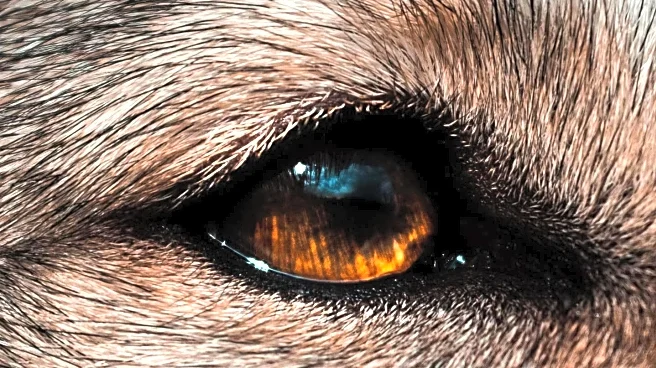What's Happening?
A woman named Alex, who owns a wolf dog named Kiba, recently experienced a surprising and positive vet visit. Kiba, a 7-year-old wolf dog with 71 percent domestic dog and 29 percent wolf genetics, has historically faced trepidation from veterinarians due to his size and intensity. Wolf dogs are considered exotic animals in some states, leading to varying regulations and challenges in veterinary care. Alex has adapted her approach over time, using a muzzle and waiting outside until an exam room is ready to reduce stress. In a recent visit, a vet treated Kiba with compassion and confidence, examining him without hesitation. This experience was shared in a viral Instagram video, highlighting the challenges and misconceptions surrounding wolf dogs in veterinary care.
Why It's Important?
The treatment of wolf dogs in veterinary care is significant due to the unique challenges they present. Wolf dogs occupy a gray area in veterinary regulations, with no approved rabies vaccine specifically for them, which can lead to euthanasia if a bite occurs. This situation underscores the importance of understanding and compassion in veterinary practice, as well as the need for clear regulations. The positive experience Alex had with a fearless vet demonstrates the potential for improved care and acceptance of wolf dogs, which are often misunderstood and mistreated. This story highlights the broader issue of how exotic animals are treated in veterinary settings and the importance of informed and empathetic care.
What's Next?
The viral video of Kiba's vet visit may encourage more veterinarians to approach wolf dogs with confidence and compassion, potentially leading to better care and understanding of these animals. It could also spark discussions about the need for standardized regulations and vaccines for wolf dogs, reducing the risk of euthanasia and improving their welfare. As awareness grows, more owners may feel empowered to advocate for their pets, ensuring they receive the care they need without fear or prejudice.
Beyond the Headlines
The story of Kiba's vet visit highlights ethical considerations in veterinary care, particularly regarding the treatment of animals considered exotic or dangerous. It raises questions about the balance between safety and compassion in veterinary practice and the need for education and training to handle such cases. The positive interaction between the vet and Kiba could inspire changes in how wolf dogs and similar animals are perceived and treated, promoting a more inclusive and understanding approach in the veterinary community.










